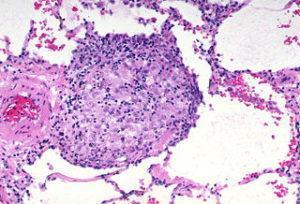The focus of studies on the immune response towards tuberculosis (TB) has mostly been on cellular immunity. However, researchers from the Ragon Institute of MGH, MIT and Harvard have found that different antibody states are associated with people with either latent or active TB. This study reveals a previously under-appreciated role for antibodies in TB disease.
Previously, the role of antibodies in TB was not well understood. Studies have shown that higher antibody titres are associated with disease severity but antibody administration has been shown to confer protection to TB disease, although this was inconsistent. Apart from T cells and macrophages, plasma cells and antibody-responsive innate cells have been found in large amounts in TB granulomas. In addition, B-cell-knockout mice have been found to be more susceptible to TB infection and depletion of B cells in primates is associated with higher TB bacterial load. Therefore, there was evidence that B cells may play a role in immunity against TB disease.
The researchers, led by Galit Alter, aimed to investigate whether specific antibody profiles corresponded with the control of TB in people with latent infection and how these profiles would differ in individuals with active TB disease. They recruited 22 South African individuals with latent TB and 20 with active TB. They also recruited participants from Mexico; 10 in each group.
The scientists used 70 antibody characteristics that were linked to Fc effector activity to identify differences between TB disease states. They found differences in antibody signatures that could distinguish between latent and active TB infection.
Antibodies obtained from people with latent TB were able to increase the efficiency of macrophages targeting TB. The antibodies worked by increasing macrophage functions such as phagolysosomal fusion and inflammasome activation. The antibodies were also able to help lower bacterial burden in in vitro assays.
There were substantial differences between the antibody glycosylation patterns between active and latent TB. These glycosylation patterns increased the effector functions of antibodies found in latent TB as compared to active TB.
Altogether, this data reveals that antibodies may play an important role in the control of TB. The different antibody profiled identified in this study could act as biomarkers to differentiate between active and latent TB. This study may also inform vaccine design as a shift to focus on both cellular and humoral immunity may be needed to create more effective immunogens to trigger protective vaccine responses.
Journal article: Lu et al., 2016. A Functional Role for Antibodies in Tuberculosis. Cell
Article by Thandeka Moyo














